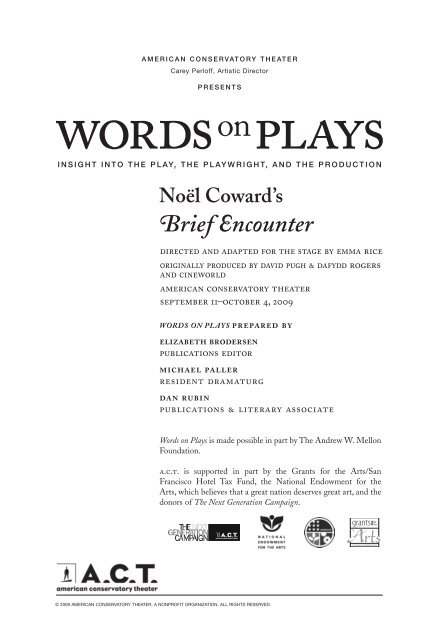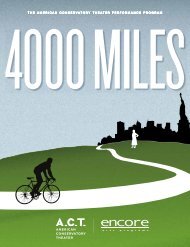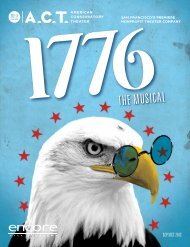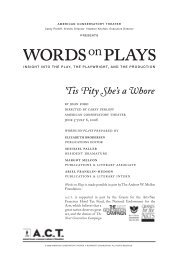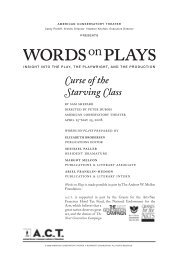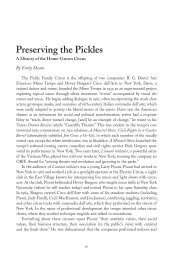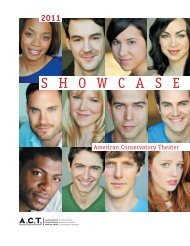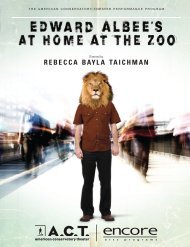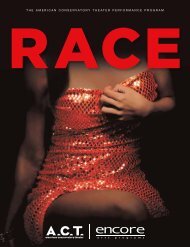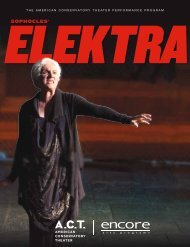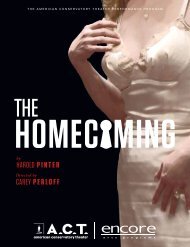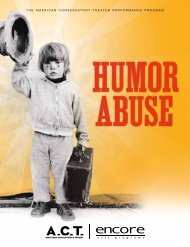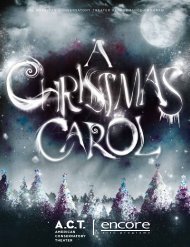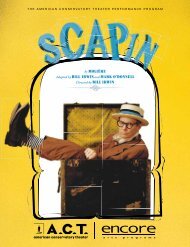Noël Coward in Brief Encounter - American Conservatory Theater
Noël Coward in Brief Encounter - American Conservatory Theater
Noël Coward in Brief Encounter - American Conservatory Theater
You also want an ePaper? Increase the reach of your titles
YUMPU automatically turns print PDFs into web optimized ePapers that Google loves.
american conservatory theater<br />
Carey Perloff, Artistic Director<br />
presents<br />
<strong>Noël</strong> <strong>Coward</strong>’s<br />
<strong>Brief</strong> <strong>Encounter</strong><br />
directed and adapted for the stage by emma rice<br />
orig<strong>in</strong>ally produced by david pugh & dafydd rogers<br />
and c<strong>in</strong>eworld<br />
american conservatory theater<br />
september 11–october 4, 2009<br />
WORDS ON PLAYS prepared by<br />
elizabeth brodersen<br />
publications editor<br />
michael paller<br />
resident dramaturg<br />
dan rub<strong>in</strong><br />
publications & literary associate<br />
Words on Plays is made possible <strong>in</strong> part by The Andrew W. Mellon<br />
Foundation.<br />
a.c.t. is supported <strong>in</strong> part by the Grants for the Arts/San<br />
Francisco Hotel Tax Fund, the National Endowment for the<br />
Arts, which believes that a great nation deserves great art, and the<br />
donors of The Next Generation Campaign.<br />
© 2009 AmeriCAn ConservAtory theAter, A nonProfit orgAnizAtion. All rights reserveD.
table of contents<br />
1. Characters, Cast, and Synopsis of <strong>Brief</strong> <strong>Encounter</strong><br />
6. <strong>Brief</strong> <strong>Encounter</strong>: A Very Grown Up Fairy Tale<br />
by Emma Rice<br />
8. The Simple Notion of Great Storytell<strong>in</strong>g: An Interview with Emma Rice<br />
by Dan Rub<strong>in</strong><br />
16. The Transmutability of Coal: An Interview with Scenic and Costume Designer<br />
Neil Murray<br />
by Dan Rub<strong>in</strong><br />
18. A <strong>Brief</strong> Biography of Sir <strong>Noël</strong> <strong>Coward</strong><br />
22. <strong>Noël</strong> <strong>Coward</strong>’s “Secret Heart”<br />
by Michael Paller<br />
26. Songs of <strong>Noël</strong> <strong>Coward</strong> <strong>in</strong> <strong>Brief</strong> <strong>Encounter</strong><br />
28. Questions to Consider / For Further Information . . .<br />
opposite Hannah Yelland and Stuart McLoughl<strong>in</strong> <strong>in</strong> <strong>Brief</strong> <strong>Encounter</strong><br />
on the cover Hannah Yelland and Milo Twomey <strong>in</strong> <strong>Brief</strong> <strong>Encounter</strong><br />
neXt paGe Joseph Alessi and Annette McLaughl<strong>in</strong> <strong>in</strong> <strong>Brief</strong> <strong>Encounter</strong><br />
Photos by Steve Tanner
characters, cast, and synopsis of<br />
b r i e f e n c o u n t e r<br />
Kneehigh Theatre’s production of <strong>Brief</strong> <strong>Encounter</strong> was orig<strong>in</strong>ally produced by Birm<strong>in</strong>gham<br />
Repertory Theatre, West Yorkshire Playhouse, and David Pugh & Dafydd Rogers<br />
<strong>in</strong> 2007. Pugh and Rogers presented it with C<strong>in</strong>eworld at the C<strong>in</strong>ema on the Haymarket<br />
<strong>in</strong> London <strong>in</strong> 2008 before the production began a u.k. tour that ended <strong>in</strong> July 2009.<br />
Emma Rice adapted <strong>Brief</strong> <strong>Encounter</strong> from <strong>Noël</strong> <strong>Coward</strong>’s 1935 play Still Life and 1945<br />
screenplay <strong>Brief</strong> <strong>Encounter</strong>, with additional songs and poems by <strong>Coward</strong>.<br />
characters and cast<br />
laura Hannah Yelland<br />
alec Milo Twomey<br />
albert/fred Joseph Alessi<br />
beryl Beverly Rudd<br />
myrtle Annette McLaughl<strong>in</strong><br />
stanley Stuart McLoughl<strong>in</strong><br />
musicians Eddie Jay, Adam Pleeth<br />
sett<strong>in</strong>g<br />
The w<strong>in</strong>ter of 1938–39. England.<br />
synopsis<br />
Prologue. The Palladium C<strong>in</strong>ema. A projected image shows Laura Jesson’s suburban<br />
home: a still life of her liv<strong>in</strong>g room with two empty armchairs. Sitt<strong>in</strong>g with Laura <strong>in</strong><br />
the audience, Alec Harvey professes his love to her. Though she feels the same about him,<br />
she <strong>in</strong>sists that they be sensible. Meanwhile Laura’s husband, Fred, enters the projection<br />
onstage and calls out to his wife. Laura dives through the screen and seems to land <strong>in</strong><br />
one of the projected armchairs. The liv<strong>in</strong>g room fades <strong>in</strong>to the image of a tra<strong>in</strong> before the<br />
screen flies out to reveal a tra<strong>in</strong> station tearoom.<br />
Act 1. scene 1. Milford Junction. A tra<strong>in</strong> station tearoom. Laura sits dr<strong>in</strong>k<strong>in</strong>g tea while<br />
Beryl Waters and her boss, Myrtle, tend the shop. Stanley, another employee, enters<br />
to replenish his concession tray and flirts with Beryl before return<strong>in</strong>g to the tra<strong>in</strong>s to<br />
sell refreshments to the passengers. Soon Albert Godby, a ticket <strong>in</strong>spector, enters to visit<br />
1
2<br />
Myrtle, who receives him coolly. The station bell r<strong>in</strong>gs and Laura goes out to the platform<br />
as Alec enters and orders tea. Laura returns hold<strong>in</strong>g a handkerchief to her face: a piece of<br />
grit has lodged itself <strong>in</strong> her eye. Alec, a doctor, offers his expertise and removes the grit.<br />
Laura thanks him. Her tra<strong>in</strong> arrives, and the two say their goodbyes. Stanley reenters and<br />
serenades Beryl with “Any Little Fish.”<br />
scene 2. The Jesson home. Laura arrives home to f<strong>in</strong>d Fred wait<strong>in</strong>g. He announces that the<br />
children, Bobbie and Margaret, have been argu<strong>in</strong>g. Laura goes upstairs to the nursery to mediate<br />
the dispute, then returns to her husband and teases him about spoil<strong>in</strong>g the children.<br />
scene 3. In transit. Alec and Laura happen upon each other and exchange pleasantries<br />
before part<strong>in</strong>g ways.<br />
scene 4. The Kardomah Restaurant. Alec sees Laura, who is sitt<strong>in</strong>g at a table. He asks<br />
if he may jo<strong>in</strong> her, as there is nowhere else to sit. She obliges. An orchestra beg<strong>in</strong>s to play<br />
nearby and Laura recalls how she played piano as a child. She gave it up because her “husband<br />
isn’t musical at all.” As they eat, she expla<strong>in</strong>s that as part of her weekly rout<strong>in</strong>e she<br />
comes to this restaurant before head<strong>in</strong>g to the c<strong>in</strong>ema. Alec suggests that he play hooky<br />
from the hospital that afternoon and accompany her to a movie. Laura agrees.<br />
scene 5. The Palladium C<strong>in</strong>ema. Laura and Alec take their seats. Myrtle and Beryl<br />
dance.<br />
scene 6. The tearoom. Alec and Laura return from the c<strong>in</strong>ema. Laura asks Alec if he<br />
feels guilty about neglect<strong>in</strong>g his work; he replies that a little relaxation never hurt anyone.<br />
Laura recounts that, as a child <strong>in</strong> Cornwall, she and her sister would sneak out and go<br />
sk<strong>in</strong>ny-dipp<strong>in</strong>g at night. Alec assures her that they have done noth<strong>in</strong>g wrong by spend<strong>in</strong>g<br />
the afternoon together, say<strong>in</strong>g, “There must be a part of you, deep down <strong>in</strong>side . . . that still<br />
longs to splash about a bit <strong>in</strong> the dangerous sea.” They talk about their spouses. Then Alec<br />
excitedly discusses his profession—preventative medic<strong>in</strong>e—and Laura is mesmerized by<br />
his passion. A bell r<strong>in</strong>gs, and Laura ushers Alec towards his tra<strong>in</strong>. Alec asks Laura to meet<br />
him the follow<strong>in</strong>g Thursday, and she agrees. Myrtle s<strong>in</strong>gs “No Good at Love.”<br />
scene 7. The Jesson home. Fred tells Laura that Bobbie was knocked down by a car on his<br />
way home from school, but he was not seriously <strong>in</strong>jured. Laura runs to her son and rocks<br />
him to sleep as she s<strong>in</strong>gs “The Wide Lagoon.” She returns to Fred, who is distracted by a<br />
crossword puzzle, and tells him about her date with Alec. He is unconcerned. Laura suggests<br />
they <strong>in</strong>vite Alec over for d<strong>in</strong>ner, but Fred jokes that he would prefer her friend visit for<br />
lunch because he is never home dur<strong>in</strong>g the day and would, therefore, not have to enterta<strong>in</strong> an<br />
afternoon guest. Laura beg<strong>in</strong>s to laugh uncontrollably at herself for worry<strong>in</strong>g “about th<strong>in</strong>gs<br />
that don’t really exist.” Assum<strong>in</strong>g that she is referr<strong>in</strong>g to Bobbie’s <strong>in</strong>jury, Fred comforts her.
Joseph Alessi and Hannah Yelland <strong>in</strong> <strong>Brief</strong> <strong>Encounter</strong> (photo by Steve Tanner)<br />
scene 8. In front of curta<strong>in</strong>. Then, the tearoom. Beryl s<strong>in</strong>gs “Mad about the Boy.” Laura<br />
is alone <strong>in</strong> the café. As Myrtle shovels coal, Albert sneaks up beh<strong>in</strong>d her and gives her a<br />
spank. Myrtle yells at Albert, concerned that Mr. Saunders, their boss, might have seen<br />
this unprofessional display. Albert serenades Myrtle, not car<strong>in</strong>g about the consequences.<br />
Stanley <strong>in</strong>terrupts to replenish his food tray, then leaves before Beryl announces to Albert<br />
that Mr. Saunders wants to see him. Albert goes.<br />
A soldier enters s<strong>in</strong>g<strong>in</strong>g “Goodbye Dolly Gray.” He orders a dr<strong>in</strong>k from Myrtle, know<strong>in</strong>g<br />
that she is not legally permitted to serve alcohol at this time of day. When Myrtle<br />
refuses to break the law, he becomes belligerent. Myrtle sends Beryl to get Albert; they<br />
both return quickly, and Albert sends the boy on his way.<br />
A tra<strong>in</strong> bell r<strong>in</strong>gs and Laura heads to her platform. Alec rushes <strong>in</strong>, apologiz<strong>in</strong>g and<br />
expla<strong>in</strong><strong>in</strong>g that he was deta<strong>in</strong>ed at the hospital and had no way of send<strong>in</strong>g word to her.<br />
Laura tells him that it doesn’t matter. Alec’s tra<strong>in</strong> whistles as they rush to his platform.<br />
He had feared he would never see her aga<strong>in</strong> and—as he jumps onto his tra<strong>in</strong> with Laura<br />
runn<strong>in</strong>g alongside—he asks her to meet him aga<strong>in</strong> the follow<strong>in</strong>g Thursday. She giddily<br />
accepts his <strong>in</strong>vitation before she is swept <strong>in</strong>to the memory of swimm<strong>in</strong>g as a young girl.<br />
Meanwhile, the company reprises “The Wide Lagoon.” Suddenly, an announcement over<br />
the loudspeaker br<strong>in</strong>gs Laura to the realization that she is about to miss her tra<strong>in</strong>.<br />
3
4<br />
<strong>in</strong>terval. Myrtle <strong>in</strong>troduces Albert’s performance of “World Weary.”<br />
A ct 11. scene 1. In a boat on a lake. Then, the tra<strong>in</strong> station. Laura and Alec share an<br />
afternoon on the water. Laura accidentally steers the boat under a low-hang<strong>in</strong>g<br />
branch: Alec is forced <strong>in</strong>to the water, and Laura dives <strong>in</strong> after him. They enter a boat hut,<br />
where they undress, careful not to show too much. “Go Slow Johnny” is heard. Laura and<br />
Alec sit on the upturned boat while their wet clothes dry nearby. Alec confesses he has<br />
fallen <strong>in</strong> love with Laura, and Laura admits that she feels the same. Yet she desperately<br />
pleads that they rema<strong>in</strong> “sensible” because neither is free to love the other. They dress. A<br />
whistle blows, and they are transported to the platform as Alec’s tra<strong>in</strong> arrives. Alec takes<br />
Laura <strong>in</strong> his arms and, despite her warn<strong>in</strong>gs, kisses her.<br />
scene 2. The Jesson home. Laura is daydream<strong>in</strong>g. Fred attempts to enterta<strong>in</strong> her with<br />
a magic trick, but Laura doesn’t seem to notice. He goes to kiss her, but she evades him.<br />
Fred heads to bed.<br />
scene 3. The Royal. Alec and Laura lunch together, dr<strong>in</strong>k<strong>in</strong>g champagne. Laura laments<br />
that their love has made her a stranger <strong>in</strong> her own life and asks if such th<strong>in</strong>gs are easier<br />
for men. Alec denies that it is any easier for him. They console each other by s<strong>in</strong>g<strong>in</strong>g<br />
about hopeful lovers (“Romantic Fool”), but are rudely <strong>in</strong>terrupted by Laura’s friends Mrs.<br />
Hermione Rolandson and Mary Norton, who spotted Laura from across the room. Laura<br />
<strong>in</strong>troduces Alec as someone she has known for years and unsuccessfully attempts to persuade<br />
the two women that they have met him before. Hermione and Mary take their leave.<br />
Alec tells Laura he is go<strong>in</strong>g back to his friend Stephen Lynn’s empty flat.<br />
scene 4. In front of curta<strong>in</strong>. Then, the tearoom. Myrtle and Albert dance and s<strong>in</strong>g about<br />
be<strong>in</strong>g “So Good at Love.” Myrtle warns they should be more discreet, but Albert ignores<br />
her. Beryl is alone <strong>in</strong> the tearoom when Stanley enters. He asks if he can walk her home,<br />
but she expla<strong>in</strong>s she has to hurry to be with her ail<strong>in</strong>g mother. He recommends that Beryl<br />
close the shop early. She agrees.<br />
scene 5. Stephen Lynn’s flat. Laura arrives at Stephen Lynn’s flat and Alec meets her at<br />
the door. He kisses her and they beg<strong>in</strong> a tender, if clumsy, dance of kisses and embraces. At<br />
the sound of someone open<strong>in</strong>g the front door, Laura escapes gracelessly out the backdoor.<br />
As Laura pulls herself together, Stephen enters his apartment. He f<strong>in</strong>ds Laura’s scarf on a<br />
chair and hands it to Alec. He confesses he had never suspected Alec would be unfaithful<br />
to his wife and apologizes for <strong>in</strong>terrupt<strong>in</strong>g the tryst. He then asks Alec to return the<br />
apartment key, admitt<strong>in</strong>g that he is disappo<strong>in</strong>ted <strong>in</strong> his friend’s behavior. Alec apologizes<br />
and leaves.<br />
scene 6. The tearoom. Beryl is almost ready to lock up when Laura enters and asks for a<br />
glass of brandy. Beryl expla<strong>in</strong>s that she is clos<strong>in</strong>g up, but Laura <strong>in</strong>sists. Beryl takes off her
hat and coat and serves Laura<br />
the dr<strong>in</strong>k.<br />
Alec rushes <strong>in</strong> and apologizes<br />
for humiliat<strong>in</strong>g her. Laura<br />
cries that they have both lost all<br />
self-respect and decency and<br />
declares their relationship cannot<br />
cont<strong>in</strong>ue. Alec acknowledges<br />
that this moment is the<br />
beg<strong>in</strong>n<strong>in</strong>g of the end of their<br />
fantasy affair. He expla<strong>in</strong>s to<br />
Laura that he has been offered<br />
a job <strong>in</strong> Johannesburg, where<br />
his brother is help<strong>in</strong>g to open<br />
a new hospital. He hadn’t<br />
decided whether or not to go<br />
because he wasn’t able to bear<br />
the idea of leav<strong>in</strong>g Laura. Now<br />
he sees that it is necessary that<br />
he go away. He asks Laura if<br />
she wants him to stay, and she<br />
calls him unk<strong>in</strong>d for ask<strong>in</strong>g<br />
her such a question. Her tra<strong>in</strong><br />
arrives; she embraces Alec and<br />
Milo Twomey and Hannah Yelland <strong>in</strong> <strong>Brief</strong> <strong>Encounter</strong> (photo by Steve Tanner)<br />
runs out to the platform. Alec<br />
stands <strong>in</strong> the darkness s<strong>in</strong>g<strong>in</strong>g “A<br />
Room with a View.”<br />
scene 7. The tearoom. Stanley rushes <strong>in</strong> to tell Beryl that her mother is very sick; Beryl<br />
leaves with him, sobb<strong>in</strong>g. Alec sits with Laura dr<strong>in</strong>k<strong>in</strong>g tea <strong>in</strong> silence. They sadly and<br />
slowly say their goodbyes: this is to be their last meet<strong>in</strong>g. Suddenly, Dolly Messiter, an<br />
acqua<strong>in</strong>tance of the Jessons, enters and sees Laura. She flops down at the table and blathers<br />
on until Alec’s tra<strong>in</strong> arrives, oblivious to the suppressed emotion of the part<strong>in</strong>g lovers.<br />
Alec says his goodbyes. Dolly cont<strong>in</strong>ues to prattle, and, as an express tra<strong>in</strong> roars through<br />
the station (and Myrtle s<strong>in</strong>gs “Always”), Laura races out to the edge of the platform.<br />
Epilogue. The Jesson home. Fred guides Laura to an armchair and thanks her for com<strong>in</strong>g<br />
back to him. He exits. Laura goes to the piano and starts to play. On the screen<br />
we see Laura swimm<strong>in</strong>g <strong>in</strong> the ocean. She loses herself <strong>in</strong> the music and floats freely.<br />
5
6<br />
brief encounter<br />
A Very Grown Up Fairy Tale<br />
by adaptor and director emma rice<br />
love romance. I also love folktales. <strong>Brief</strong> <strong>Encounter</strong><br />
I has surpris<strong>in</strong>gly embraced both these passions.<br />
In Still Life, later to become <strong>Brief</strong> <strong>Encounter</strong>,<br />
<strong>Noël</strong> <strong>Coward</strong> wrote a play about an affair. Not<br />
a sordid affair but a love affair between two<br />
married people. An impossible affair; a pa<strong>in</strong>ful<br />
affair; an unacceptable affair. It is written with<br />
such empathy, such observation, and such tender<br />
agony. This man knew what he was writ<strong>in</strong>g<br />
about. Imag<strong>in</strong>e be<strong>in</strong>g gay <strong>in</strong> the 1930s and you<br />
beg<strong>in</strong> to understand <strong>Brief</strong> <strong>Encounter</strong>. Imag<strong>in</strong>e the<br />
impossibility of express<strong>in</strong>g the most fundamental<br />
of human needs and emotions. Imag<strong>in</strong>e the<br />
enforced shame, lies, and deceit. Imag<strong>in</strong>e the<br />
frustration, imag<strong>in</strong>e the loss, and imag<strong>in</strong>e the<br />
Emma Rice<br />
anger. Each of these emotions is delicately and<br />
Britishly traced through the meet<strong>in</strong>g of our lovers. They experience a micromarriage,<br />
a relationship from beg<strong>in</strong>n<strong>in</strong>g to end <strong>in</strong> a few short hours—and how many of<br />
us cannot relate to this careful and pa<strong>in</strong>ful liaison? Not many—I’m sure. Can many of us<br />
go through a lifetime without meet<strong>in</strong>g someone and feel<strong>in</strong>g a spark of recognition that we<br />
shouldn’t, an attraction that goes beyond the physical? And what a terrible world it would<br />
be if our emotions and spirits and psyches were amputated at the altar.<br />
And here is where real life ends and folktales beg<strong>in</strong>.<br />
In the language of stories, we are able to exam<strong>in</strong>e the barga<strong>in</strong>s that human be<strong>in</strong>gs make.<br />
We see how we barga<strong>in</strong> our own needs, the needs of the self, for various reasons. These<br />
reasons will be familiar to us all: the fear of be<strong>in</strong>g alone or of be<strong>in</strong>g excluded from “normal”<br />
life. In the language of folk stories the price of this barga<strong>in</strong> is often physical. A part of the<br />
body is chopped off—a hand (The Handless Maiden) or feet (The Red Shoes). We literally<br />
cut a part of ourselves off <strong>in</strong> order to conform or to be accepted. In <strong>Brief</strong> <strong>Encounter</strong>, both<br />
our lovers have chopped off part of themselves. It is delicately referred to, but Laura talks<br />
of swimm<strong>in</strong>g wild and free and of play<strong>in</strong>g the piano. Both of these are forms of personal
expression—not pleas<strong>in</strong>g anyone but explor<strong>in</strong>g the deep waters of the soul. Alec turns <strong>in</strong>to<br />
a child when he talks of his passions, and fears that Laura will be bored. These are people<br />
trapped by the barga<strong>in</strong>s that they have freely made—they have barga<strong>in</strong>ed their <strong>in</strong>ner lives<br />
for stability, family, and love. Oh yes, love. I don’t for a moment believe that their marriages<br />
are all bad or that they are be<strong>in</strong>g abused <strong>in</strong> any way. Presumably, their respective partners<br />
are as trapped by their own barga<strong>in</strong>s and by the rules of society itself. None of us are victims,<br />
but we can review the barga<strong>in</strong>s we make and escape <strong>in</strong> a profound way.<br />
I have been read<strong>in</strong>g many selkie stories whilst mak<strong>in</strong>g this piece. In these stories, a<br />
fisherman falls <strong>in</strong> love with a selkie—or seal woman—whom he sees danc<strong>in</strong>g on the rocks<br />
hav<strong>in</strong>g slipped out of her sealsk<strong>in</strong>. She too, falls for him. He takes her home and hides her<br />
sk<strong>in</strong>. He cares for her and she for him; they have children and live a life of contentment.<br />
One day, she f<strong>in</strong>ds her old sk<strong>in</strong> <strong>in</strong> a cupboard. She washes and dresses the children, kisses<br />
them goodbye, puts on her sealsk<strong>in</strong> and dives back <strong>in</strong>to the sea. She never returns, but<br />
sometimes the children will see a beautiful seal swimm<strong>in</strong>g far out at sea. This teaches us<br />
about our true self. No matter how much we try to repress our feel<strong>in</strong>gs or how much we<br />
wish to conform, our true self will always emerge. There can be no happily ever after until<br />
this true self, or nature, has been accepted and embraced.<br />
In the language of folktales, <strong>in</strong> order to f<strong>in</strong>d one’s true self, it is often vital that there is<br />
a near-death experience before our heroes and hero<strong>in</strong>es can beg<strong>in</strong> to heal and to reform. In<br />
Sleep<strong>in</strong>g Beauty and Snow White our hero<strong>in</strong>es are unconscious, almost dead for long periods<br />
of time. In <strong>Brief</strong> <strong>Encounter</strong> our lovers also die spiritually when they part. “I never want to<br />
feel anyth<strong>in</strong>g aga<strong>in</strong>,” says Laura. This deep depression is an essential part of the process of<br />
change. It is someth<strong>in</strong>g to be endured, understood, and then moved away from. The end<br />
of the affair is not the end of hope or of love. It is part of the process of change. Alec will<br />
travel and see the world <strong>in</strong> a wider context. Laura will have to reimag<strong>in</strong>e herself, not just<br />
as a “respectable wife and mother” but as a person <strong>in</strong> her own right.<br />
My hope is that, like the seal woman, Alec and Laura escape. Not with each other <strong>in</strong><br />
some idealistic romantic way, but an escape provoked by the profound and personal awaken<strong>in</strong>g<br />
they felt when they met. We humans are fearful by nature—it is often somebody else<br />
who provides the catalyst for change, but they are not the cause. Change can only happen<br />
from with<strong>in</strong>. After our story ends, I like to th<strong>in</strong>k that our lovers will change. I imag<strong>in</strong>e<br />
that Alec will make a real difference <strong>in</strong> Africa and f<strong>in</strong>d an expanse of spirit that seems<br />
untouchable <strong>in</strong> our story. I hope and dream that Laura will take up the piano aga<strong>in</strong> and<br />
perform on the world’s greatest and most awe-<strong>in</strong>spir<strong>in</strong>g stages.<br />
As I write this, I wonder if these are, <strong>in</strong> fact, my dreams? That is the power of a great<br />
and endur<strong>in</strong>g story; we can all own it and feel it and f<strong>in</strong>d someth<strong>in</strong>g of ourselves <strong>in</strong> it.<br />
7
8<br />
the simple notion of great storytell<strong>in</strong>g<br />
An Interview with Emma Rice<br />
by dan rub<strong>in</strong><br />
Emma Rice is the artistic director of Kneehigh Theatre and the director of <strong>Brief</strong><br />
<strong>Encounter</strong>, which she also adapted for the stage. She jo<strong>in</strong>ed Kneehigh as an actor <strong>in</strong><br />
1994 and is responsible for push<strong>in</strong>g the company towards its <strong>in</strong>ternationally recognized<br />
style of idiosyncratic, <strong>in</strong>telligent storytell<strong>in</strong>g. She has also directed for Kneehigh The Itch,<br />
Pandora’s Box, Wild Bride, The Red Shoes, The Wooden Frock, The Bacchae, Tristan & Yseult,<br />
Nights at the Circus, Cymbel<strong>in</strong>e, Rapunzel, A Matter of Life and Death, and Don John.<br />
you began <strong>in</strong> theater as an actor?<br />
Yes, I tra<strong>in</strong>ed as an actress and certa<strong>in</strong>ly worked the first 15 years of my career primarily<br />
act<strong>in</strong>g. But I started to become <strong>in</strong>volved with devis<strong>in</strong>g work, so I th<strong>in</strong>k I started develop<strong>in</strong>g<br />
my directorial skills as an actor and it became a very natural progression to gently slip out<br />
of act<strong>in</strong>g and become a director.<br />
so it was a gradual process rather than a def<strong>in</strong>itive moment?<br />
No, there was a def<strong>in</strong>ite shift: I was work<strong>in</strong>g with Kneehigh as an actor and they said to<br />
me, because I was so bossy by that po<strong>in</strong>t and shap<strong>in</strong>g rehearsals dur<strong>in</strong>g tours and hav<strong>in</strong>g<br />
lots of ideas, “When are you go<strong>in</strong>g to direct a show?” And I said, “No, no, no, I don’t need<br />
to direct.” And they said, “Go on, Emma, go on. What would you direct?” And I knew<br />
exactly what I’d do, so they gave me a show. That very first show I directed I acted <strong>in</strong>, as<br />
well, and that cont<strong>in</strong>ued for a few years: I put myself <strong>in</strong> shows and kept act<strong>in</strong>g. Now I try<br />
not to. I love direct<strong>in</strong>g so much that I don’t miss act<strong>in</strong>g anymore.<br />
what was that first show?<br />
The Itch, which was a version of a Jacobean tragedy called The Changel<strong>in</strong>g.<br />
was kneehigh your first artistic home after you tra<strong>in</strong>ed at guildhall<br />
school of music and drama?<br />
I did lots of bips and bobs and I was with another theater company called Theatre Alibi<br />
for many years before I jo<strong>in</strong>ed Kneehigh. And with Theatre Alibi I traveled to Poland,<br />
where I worked with the Gardzienice Theatre Association as a performer. I’ve had three<br />
theater homes really.
One of the barns <strong>in</strong> Cornwall where Kneehigh Theatre creates its free-spirited work (photo courtesy Kneehigh Theatre)<br />
but you’ve been with kneehigh s<strong>in</strong>ce 1994?<br />
Kneehigh is extraord<strong>in</strong>ary and it was love at first sight. The Kneehigh barns, where we<br />
rehearse, are on the south coast of England <strong>in</strong> the county of Cornwall, so it is very wild and<br />
very beautiful. Kneehigh was this band of gypsies to my eyes, not like actors you’d meet <strong>in</strong><br />
London. They were browned from the sun with wild hair and play<strong>in</strong>g music. It was very<br />
excit<strong>in</strong>g and very sexy. They were more like brigand rock stars than f<strong>in</strong>ely coiffured actors.<br />
I came with quite a serious and rigorous theater ethos, and they very much came from a<br />
comedy and clown<strong>in</strong>g background, and I th<strong>in</strong>k there was a fantastic chemistry between<br />
us <strong>in</strong>stantaneously, and that cont<strong>in</strong>ues to this day really. I th<strong>in</strong>k that is why the Kneehigh<br />
brand works so well, because the comedy and the tragedy sit so beautifully next to each<br />
other. They gave me a sense of humor and brought a huge amount of joy <strong>in</strong>to my work.<br />
And we sit outside the capital, which really makes a difference to us all: we are not part of<br />
the bus<strong>in</strong>ess. We are our own world that we create and <strong>in</strong>habit.<br />
does that give you more freedom?<br />
It’s freedom from the fear of be<strong>in</strong>g accepted. We do what we do. We’re not constantly<br />
judg<strong>in</strong>g ourselves based on what other people th<strong>in</strong>k or, <strong>in</strong>deed, where our next job will be.<br />
9
10<br />
We are supported by our community, and we’re also a community <strong>in</strong> ourselves, so we support<br />
each other. I th<strong>in</strong>k it’s very free<strong>in</strong>g for the work that we come together here [<strong>in</strong> the<br />
barns] and make theater. We challenge ourselves on our own terms; we’re not really guided<br />
or <strong>in</strong>fluenced by other people.<br />
when did you transition from a director with kneehigh to the<br />
artistic director of the company?<br />
It was such a gradual progression I can’t even remember. I th<strong>in</strong>k it was five years ago now.<br />
It was natural. Kneehigh’s been go<strong>in</strong>g for 30 years, and I’ve certa<strong>in</strong>ly learned from my predecessors<br />
that the only way to survive is to embrace change. And change was com<strong>in</strong>g: my<br />
direct<strong>in</strong>g style was tak<strong>in</strong>g the work to different places and to different audiences.<br />
how so?<br />
Kneehigh was famous because there were no theaters <strong>in</strong> Cornwall until about ten years<br />
ago, so Kneehigh traditionally has always performed outdoors: <strong>in</strong> woodlands and on<br />
beaches, on cliff tops and <strong>in</strong> car parks. And that meant the work was very bold, with broad<br />
brushstrokes, and often very funny. Because it started <strong>in</strong> the daylight, the work had to have<br />
a sort of almost brazen quality.<br />
I th<strong>in</strong>k my work has kept a lot of the boldness, but it has f<strong>in</strong>e-tuned a lot of the art<br />
and a lot of the performance. Also, the work has come <strong>in</strong>doors and, although I th<strong>in</strong>k we’re<br />
still improved by the elements, I’ve really distilled a lot of the work we’d done <strong>in</strong> the open<br />
air. Another company was spawned out of Kneehigh called WildWorks, which has really<br />
taken all the open-air work. They keep work<strong>in</strong>g on a very big scale with lots of people.<br />
They have 200 people <strong>in</strong> a show and it’s fantastic, but it’s not what I want to do. I want<br />
to tell stories and f<strong>in</strong>d the emotion and the f<strong>in</strong>ely drawn human relationships that I th<strong>in</strong>k<br />
theater is about.<br />
do you have a performance space <strong>in</strong> cornwall now?<br />
Yes, there’s a theater called Hall for Cornwall. It used to be the old town hall. We share<br />
it. It’s not ours. And I say that we don’t perform outdoors, but we still try to f<strong>in</strong>d unusual<br />
places [to perform], and our plan is to have a huge tent [The Asylum] that we can hitch<br />
up <strong>in</strong> excit<strong>in</strong>g places <strong>in</strong> Cornwall. We would control the food and the music and the whole<br />
experience, and you’d still get to smell the sea air. We hope to tour nationally and <strong>in</strong>ternationally<br />
with The Asylum and really be able to deliver an experience from the m<strong>in</strong>ute<br />
people arrive at the space to the m<strong>in</strong>ute they leave.
how important is tour<strong>in</strong>g for kneehigh?<br />
We’ve always toured because we’ve never had a theater of our own. And we’ve been tour<strong>in</strong>g<br />
<strong>in</strong>ternationally more and more with the work, which we love. I can’t th<strong>in</strong>k of anyth<strong>in</strong>g<br />
better than travel<strong>in</strong>g with the group of people you make work with and meet<strong>in</strong>g<br />
other communities across the world. We’ve been to Colombia and Brazil and Ch<strong>in</strong>a and<br />
Lebanon—we’ve been to some amaz<strong>in</strong>g places <strong>in</strong> the last few years. And, of course, the<br />
States!<br />
yet kneehigh prides itself on be<strong>in</strong>g true to its cornish roots. have<br />
there been any challenges <strong>in</strong> translat<strong>in</strong>g your work for other<br />
cultures, both <strong>in</strong> england and <strong>in</strong>ternationally?<br />
It’s not really quantifiable; it’s someth<strong>in</strong>g that is rather than someth<strong>in</strong>g we nurture. We had<br />
the oddest th<strong>in</strong>g happen when we went to Australia with our show Tristan & Yseult. We<br />
started the show and suddenly all these Cornish flags were wav<strong>in</strong>g: the black and white flag<br />
of Cornwall. And you realize that so many people emigrated from Cornwall and there’s a<br />
great sense of ownership of that.<br />
I th<strong>in</strong>k that the ma<strong>in</strong> th<strong>in</strong>g is that people realize we’re not just a company of actors but<br />
a community, and that we’re from somewhere. I th<strong>in</strong>k people are very excited when they see<br />
pictures of where we make the work and where we live. It’s not just a city. It’s somewhere<br />
very special. I th<strong>in</strong>k people really do respond to that, and we do as well: we not only know<br />
what we do, we know who we are, and where we come from, and I th<strong>in</strong>k that’s a very strong<br />
and privileged th<strong>in</strong>g <strong>in</strong> life.<br />
tell me about the barns where you make the work.<br />
It’s a m<strong>in</strong>i world. We’ve got a huge kitchen because food is very important. We love to eat<br />
and talk together: that’s where a lot of the relationships and ideas are made. And we’ve got a<br />
rehearsal space, a music room, costume [storage], workshops. Also we can go and stay there<br />
when we make work. So for those weeks we drop everyth<strong>in</strong>g and say, “We’re go<strong>in</strong>g to make<br />
a show.” We certa<strong>in</strong>ly don’t live together all of the time. We all go and descend on the barns,<br />
and what’s amaz<strong>in</strong>g is that, because there is noth<strong>in</strong>g to do there apart from be there and be<br />
with each other, we keep work<strong>in</strong>g. People play music <strong>in</strong>to the night. People have ideas. We<br />
laugh. Two weeks at the barns is like two months <strong>in</strong> the rehearsal room, and the work is so<br />
deep and such fun that you don’t notice it’s happen<strong>in</strong>g.<br />
11
12<br />
what is your role as the director when the work is created by an<br />
ensemble?<br />
I’m def<strong>in</strong>itely the author of the work and the world that I wish to create, but the collective<br />
imag<strong>in</strong>ation is far greater than the <strong>in</strong>dividual’s, so as a director I try to lay as many<br />
foundations as possible for the piece and then let the actors be as free with<strong>in</strong> that world as<br />
they can possibly be, because they will always surprise me. They will always come up with<br />
someth<strong>in</strong>g I would never have thought of. Many ideas come from many places. The trick is<br />
to have a strong enough vision that people have those good ideas because they understand<br />
the world that we’re mak<strong>in</strong>g. Noth<strong>in</strong>g gets by me. I’m tougher than I pretend. I’m a collector<br />
and an editor, as well as an author.<br />
one of the similarities between a.c.t. and kneehigh is the desire<br />
to re<strong>in</strong>vigorate classic literature. can you talk about why you’re<br />
attracted to these stories?<br />
<strong>Theater</strong> is storytell<strong>in</strong>g. Sometimes it becomes about lots of other th<strong>in</strong>gs, but ultimately<br />
human be<strong>in</strong>gs like to come together and be told a story and to be transported. There’s<br />
someth<strong>in</strong>g very simple about that notion. I th<strong>in</strong>k there are probably very few great stories,<br />
and the great stories have survived because they hit a fundamental human nerve. So<br />
C<strong>in</strong>derella is a classic story because there aren’t many of us who, when we were young,<br />
didn’t feel unloved, didn’t feel ugly, and didn’t feel that the world was turned aga<strong>in</strong>st us. So<br />
those stories are told for good reason. They speak to us on a very profound level.<br />
As a director I’m <strong>in</strong>terested <strong>in</strong> those tales that talk to us about freedom and how to<br />
negotiate the responsibility of life with the needs and possibilities of be<strong>in</strong>g a human be<strong>in</strong>g.<br />
One of my first pieces of work was The Red Shoes, which is very much about how you deal<br />
with desire and obsession when society is tell<strong>in</strong>g you not to, what can go wrong, what the<br />
dangers are. With <strong>Brief</strong> <strong>Encounter</strong>, I’ve used a lot of scenes from the selkie tales, which tell<br />
of the seal woman who comes onto dry land and marries and has children, but ultimately<br />
kisses her children goodbye and swims back <strong>in</strong>to the sea because that is who she is.<br />
Different stories come to you at different times <strong>in</strong> your life and they’re very, very powerful,<br />
and they do help you. A lot of them are about endurance, about when you th<strong>in</strong>k you<br />
can’t go on. These stories say, “You can. You will. There are ways.”<br />
when did you realize you wanted to revisit brief encounter?<br />
It happened almost by accident, which is, of course, the best way. Stories visit you when<br />
you least expect them, and if you concentrate too hard—get too academic—you cut off<br />
your <strong>in</strong>st<strong>in</strong>cts. <strong>Brief</strong> <strong>Encounter</strong> literally caught my eye. Somebody was talk<strong>in</strong>g to me about
do<strong>in</strong>g Peter Pan (which I didn’t want to do), and I flicked my eye [towards the bookshelf ]<br />
and said, “I don’t want to do Peter Pan, but if you’d asked me to do <strong>Brief</strong> <strong>Encounter</strong> this<br />
would be a very different conversation.” So that is how it started: my eyes catch<strong>in</strong>g sight<br />
of a book.<br />
And, of course, I love it because I love love, and I love romance. It’s the best feel<strong>in</strong>g <strong>in</strong><br />
the world, and a lot of my work is about that heady feel<strong>in</strong>g of love and what happens to<br />
us. I love <strong>Brief</strong> <strong>Encounter</strong> because it is so British and so elemental. It’s about fall<strong>in</strong>g <strong>in</strong> love<br />
with somebody that you can’t have. I don’t th<strong>in</strong>k there are many adult human be<strong>in</strong>gs who<br />
haven’t been <strong>in</strong> that situation at some po<strong>in</strong>t <strong>in</strong> their lives. Then I started work<strong>in</strong>g on it. I<br />
had had that very <strong>in</strong>st<strong>in</strong>ctual draw towards the piece, but then I was knocked out with how<br />
sensational <strong>Noël</strong> <strong>Coward</strong>’s words are: how beautifully observed they are. Then th<strong>in</strong>k<strong>in</strong>g<br />
about Laura’s freedom on a fem<strong>in</strong>ist level . . . The first version of this play, called Still Life,<br />
is about choos<strong>in</strong>g: you can choose to live or you can choose to have this still life <strong>in</strong> which<br />
your true desires and needs as a human be<strong>in</strong>g aren’t be<strong>in</strong>g met, which I th<strong>in</strong>k happens to<br />
so many people.<br />
does laura choose the still life <strong>in</strong> the end?<br />
I hope not. In my version, she might not get her man, but I hope she gets herself.<br />
why do you th<strong>in</strong>k it’s a british piece?<br />
Maybe I’m wrong, but I th<strong>in</strong>k culturally <strong>in</strong> Brita<strong>in</strong> we are very aware of how repressed we<br />
are and how restra<strong>in</strong>ed we can be. I th<strong>in</strong>k <strong>Brief</strong> <strong>Encounter</strong> is a lesson <strong>in</strong> restra<strong>in</strong>t. Nobody<br />
really talks about their emotions. Laura never says, “I love you.” There are th<strong>in</strong>gs that are<br />
never said <strong>in</strong> this story, which I th<strong>in</strong>k is very British, but I hope that’s also universal. I have<br />
no doubt an <strong>American</strong> audience will understand and respond to the piece and understand<br />
the human situation. I’m not worried about that at all and I’m very excited. But I would<br />
be <strong>in</strong>terested to wonder if you could ever do an <strong>American</strong> production. Would <strong>American</strong>s<br />
have had this relationship?<br />
i wonder if it is slightly foreign less because it is <strong>in</strong> brita<strong>in</strong> and<br />
more because it takes place 70 years ago?<br />
In Brita<strong>in</strong> people discussed how this affair wouldn’t happen now: they would just sleep<br />
together. I really dispute that. I th<strong>in</strong>k all sorts of th<strong>in</strong>gs are acceptable <strong>in</strong> society, but that<br />
doesn’t mean they are less pa<strong>in</strong>ful or that the issues are less fundamental. So, from my own<br />
experience, it doesn’t feel dated. The accents might feel a little dated, but the situation . . .<br />
we all struggle to do our best and at times that is <strong>in</strong>credibly pa<strong>in</strong>ful.<br />
13
14<br />
what was the process of creat<strong>in</strong>g brief encounter like?<br />
I was work<strong>in</strong>g with a script, which I don’t normally do. I normally devise work, so this was<br />
a new process. Before I started work<strong>in</strong>g with any actors, I worked through <strong>Coward</strong>’s songs<br />
and poetry and layered <strong>in</strong> lots of his lesser-known works, elements that delighted me and<br />
I had no doubt they would delight audiences as well. And then we worked. We did some<br />
what we call “r & d”—research and development. We did a week <strong>in</strong> advance, when, with<br />
the actors, I explored if this idea was go<strong>in</strong>g to work and worked on the design. Then we<br />
got together and started to put it together.<br />
Our process always <strong>in</strong>volves improvisation with character work. There’s a great freedom<br />
<strong>in</strong> that process. Th<strong>in</strong>gs come together very late. If you direct very strongly from word go<br />
you never know what you’re go<strong>in</strong>g to miss. You just have your own vision. So it was a very<br />
playful process. And it’s still chang<strong>in</strong>g now. There will be changes com<strong>in</strong>g to the States.<br />
I still look at it and th<strong>in</strong>k, “Oh, I could do that a little bit different. Or a little bit better.”<br />
Noth<strong>in</strong>g fundamental, but I feel that a piece of theater is never done because the world<br />
around us changes. You always f<strong>in</strong>d new th<strong>in</strong>gs to discover.<br />
when was the decision made to have live theater and film exist on<br />
the stage at the same time?<br />
I never wanted to replicate the film because, Why would you do that? It’s a brilliant film<br />
that people can watch, so that was never the aim. But because it is such an iconic British<br />
film my first idea about the piece was that it had to be really referential to that film. But<br />
it also had to be very referential to theater. I wanted to boldly play with both those forms<br />
so that the audience would delight <strong>in</strong> the live event. This is why at times the curta<strong>in</strong> will<br />
come down and people enterta<strong>in</strong> <strong>in</strong> front of it—that’s a very British theatrical tradition.<br />
But we’ve also got the big c<strong>in</strong>ema screen with people burst<strong>in</strong>g <strong>in</strong> and out of it. I thought<br />
this had to be totally about film and totally about theater all <strong>in</strong> one even<strong>in</strong>g.<br />
where does the music fit <strong>in</strong>to this?<br />
We’ve woven <strong>in</strong> not only some of <strong>Noël</strong> <strong>Coward</strong>’s beautiful music but also there’s an underscore<br />
of music that, with the film on the back wall, acts as a k<strong>in</strong>d of metaphor for what’s<br />
go<strong>in</strong>g on underneath the very restra<strong>in</strong>ed simple conversations. The sea on the back wall<br />
and this roll<strong>in</strong>g live music (as well as some carefully chosen bits of Rachman<strong>in</strong>ov) takes us<br />
<strong>in</strong>to that emotion, cast<strong>in</strong>g a spell over the whole production that is really irresistible.
Annette McLaughl<strong>in</strong> (left) and Beverly Rudd <strong>in</strong> <strong>Brief</strong> <strong>Encounter</strong> (photo by Steve Tanner)<br />
how did you choose the noël coward songs for the show?<br />
I feel the show is about love <strong>in</strong> all its forms. The three couples represent three different<br />
stages and parts of love. There’s that beautiful song called “Any Little Fish”—“Any little<br />
fish can swim . . . But I can’t do anyth<strong>in</strong>g at all, but just love you”—which fits very nicely<br />
at the beg<strong>in</strong>n<strong>in</strong>g when everyone is hopeful, before anyth<strong>in</strong>g goes wrong. Then there’s that<br />
fantastic poem we used called “I’m No Good at Love”; I feel the bitterness of the end the<br />
moment it beg<strong>in</strong>s. It’s the most heartbreak<strong>in</strong>g poem that <strong>Coward</strong> wrote, and he wrote it<br />
about himself. What a terrible th<strong>in</strong>g love is: it’s the most glorious sensation, but we also<br />
feel excluded from it at times. That fits <strong>in</strong> one of the characters’ mouths so beautifully.<br />
I went through <strong>Coward</strong>’s whole canon look<strong>in</strong>g for his <strong>in</strong>sights <strong>in</strong>to love. He was gay <strong>in</strong><br />
the 1930s. He would have experienced more sadness and anger and shame than most, and<br />
you feel that com<strong>in</strong>g through <strong>in</strong> his writ<strong>in</strong>g, as well as the beauty of it. When I hear the<br />
lyrics of the song “A Room with a View”—“A room with a view and you / No one to worry<br />
us”—it breaks my heart because, <strong>in</strong> his time, if he met somebody, that would have been<br />
all they wanted. Just some privacy to be themselves. So the songs chose themselves, really,<br />
and it was just the most wonderful task to look through his words. Because he’s brilliant,<br />
as well: so naughty! He wrote some really naughty lyrics! I would have loved to have met<br />
him because he was bloody funny and bloody honest. It would have been remarkable.<br />
15
16<br />
the transmutability of coal<br />
An Interview with Scenic and Costume Designer Neil Murray<br />
by dan rub<strong>in</strong><br />
Neil Murray is an associate director and designer at Newcastle’s Northern Stage, the largest<br />
produc<strong>in</strong>g theater company <strong>in</strong> northeast England. His design for <strong>Brief</strong> <strong>Encounter</strong> won<br />
the Even<strong>in</strong>g Standard and Critics Circle awards and was nom<strong>in</strong>ated for the Olivier Award<br />
for Best Design.<br />
how did you become <strong>in</strong>volved with b r i e f e n c o u n t e r ?<br />
I’ve known Emma [Rice] for a long time, and I worked with her and Kneehigh a few years<br />
ago [as codirector on Pandora’s Box]. I came on board early on and we talked a lot about the<br />
world of <strong>Brief</strong> <strong>Encounter</strong> and what we needed to do given that there was go<strong>in</strong>g to be film.<br />
There are three different k<strong>in</strong>ds of film [<strong>in</strong> this production]. There is the film that acts as<br />
a backdrop that establishes where we are. Then there is a screen that makes the audience<br />
actually feel as if they are <strong>in</strong> the c<strong>in</strong>ema. We were always keen to merge live act<strong>in</strong>g with<br />
film, so we devised a screen made of elastic with slits <strong>in</strong> it allow<strong>in</strong>g characters to emerge<br />
from and disappear <strong>in</strong>to film. They would, live, move <strong>in</strong>to and through the film, and then<br />
we would be left with a film image of them, and vice versa.<br />
Then there is the moment Laura is contemplat<strong>in</strong>g suicide, this <strong>in</strong>credible, fabulous<br />
moment when she climbs up on the bridge. We use a screen that runs on a wire, and<br />
someone tears across the space [with the screen] and immediately this tra<strong>in</strong> rushes across<br />
the stage [projected onto that screen]. It’s a good moment.<br />
We also talked a lot about the nature of the story and the k<strong>in</strong>ds of locations. It was<br />
go<strong>in</strong>g to be a composite world, a strange world of amalgamate elements that somehow<br />
gel together. <strong>Brief</strong> <strong>Encounter</strong> is not a naturalistic world, but it is made up of naturalistic<br />
elements juxtaposed <strong>in</strong> a poetic way. For <strong>in</strong>stance, when we first opened [at Birm<strong>in</strong>gham<br />
Repertory Theatre], we had an enormous stage. So spill<strong>in</strong>g <strong>in</strong>to this world we had<br />
two enormous heaps of coal. Then we went to London and moved <strong>in</strong>to a three-screen<br />
C<strong>in</strong>eworld c<strong>in</strong>ema[, previously the Carlton Theatre on London’s Haymarket, not far from<br />
where <strong>Brief</strong> <strong>Encounter</strong> the film opened <strong>in</strong> 1945], which was extraord<strong>in</strong>arily small given<br />
where we’d been. It was a bit of a nightmare. The coal heaps got very, very reduced.<br />
what adjustments had to be made for a u.s. tour?<br />
After London we did the British tour, which was months of tour<strong>in</strong>g to lots of theaters.<br />
We’d go to different-sized places, as with any tour. Also, because of the nature of tour<strong>in</strong>g,
Hannah Yelland (live onstage) and Milo Twomey (projection on screen) <strong>in</strong> <strong>Brief</strong><br />
<strong>Encounter</strong> (photo by Steve Tanner)<br />
you have to do a get-<strong>in</strong> on<br />
Monday morn<strong>in</strong>g and do your<br />
first performance on Tuesday<br />
night. That’s tight. That’s a<br />
bit scary. Adjustments were<br />
made. For <strong>in</strong>stance, the coal<br />
heaps became sacks of coal<br />
because they are easy to get<br />
<strong>in</strong> and out. So what you have<br />
<strong>in</strong> San Francisco is what has<br />
just toured Brita<strong>in</strong> because it<br />
fits <strong>in</strong>to your theater as it is.<br />
is kneehigh br<strong>in</strong>g<strong>in</strong>g<br />
over the coal with<br />
them?<br />
Yes, as far as I know. But it’s<br />
just the sacks. The coal is<br />
less significant now. It used<br />
to be a wonderful feature.<br />
But, hey.<br />
were there any<br />
debacles with the<br />
splits <strong>in</strong> the screen?<br />
It was a complete nightmare.<br />
We’d seen a film of a Spanish<br />
company do<strong>in</strong>g it, so we knew it was possible, and I’d seen a Dutch dance company use a<br />
similar th<strong>in</strong>g, so I knew the process, but the mak<strong>in</strong>g of it was a bit of a challenge.<br />
is your design of the tearoom and railway station based on a real<br />
location?<br />
No, because it came out of the workshops <strong>in</strong> Cornwall. The buffet bar—where the women<br />
serve tea and buns from—is the piano that, most importantly perhaps, the Rachman<strong>in</strong>ov<br />
is played from. And that is a very Kneehigh way of work<strong>in</strong>g: they are rather anarchic, I<br />
suppose. They take the elements of a buffet and add a multifunctional piano.<br />
17
18<br />
a brief biography of sir noël coward<br />
B orn <strong>in</strong> Tedd<strong>in</strong>gton, Middlesex, on December 16, 1899, to Violet and Arthur <strong>Coward</strong>,<br />
the second of three sons, <strong>Noël</strong> <strong>Coward</strong> had little formal education. From a very early<br />
age he—and his mother—knew that the theater was to be his education and his world.<br />
He was enrolled <strong>in</strong> the Italia Conti stage school and at the age of 11 appeared as Pr<strong>in</strong>ce<br />
Mussel <strong>in</strong> The Goldfish. From then on he was a child actor and was soon cast as Slightly,<br />
one of the lost boys <strong>in</strong> the perennial Peter Pan. Critic Kenneth Tynan was to observe many<br />
years later of the mature <strong>Noël</strong>: “Forty years ago he was Slightly <strong>in</strong> Peter Pan and you might<br />
say that he’s been wholly Peter Pan ever s<strong>in</strong>ce.” One benefit of those early years was meet<strong>in</strong>g<br />
another child actor, Gertrude Lawrence, who was to be become his closest friend and<br />
favorite stage partner.<br />
By the age of 16 <strong>Coward</strong> had played his first adult role <strong>in</strong> Charley’s Aunt and written the<br />
music and lyrics to his first song, “Forbidden Fruit.” By 20 he had begun writ<strong>in</strong>g plays and<br />
revues, <strong>in</strong> most of which he fully <strong>in</strong>tended to star. I’ll Leave It to You (1920) and The Young<br />
Idea (1923) were only moderate successes, but the <strong>Coward</strong> name was becom<strong>in</strong>g known. The<br />
breakthrough came <strong>in</strong> 1924 with The Vortex—a play that was shock<strong>in</strong>g for its time <strong>in</strong> its<br />
portrayal of adultery and drug addiction. The play and its young author became a sensation<br />
on both sides of the Atlantic. Three more major hits soon followed—Hay Fever and Fallen<br />
Angels (both 1925) and Easy Virtue (1926).<br />
In the late 1920s and early 1930s success followed success. There was the operetta Bitter<br />
Sweet (1929); Private Lives (1930), which def<strong>in</strong>ed the legend that became “<strong>Noël</strong> and Gertie”;<br />
the play-cum-patriotic Cavalcade (1931); and Design for Liv<strong>in</strong>g (1933), the starr<strong>in</strong>g vehicle<br />
he wrote specifically for himself and his close friends Alfred Lunt and Lynne Fontanne.<br />
The year 1935 saw one of <strong>Coward</strong>’s most ambitious ventures—Tonight at 8:30, a series<br />
of ten one-act plays <strong>in</strong> which he and Gertie played all the leads. Several of the plays were<br />
subsequently filmed, none more effectively than Still Life, which <strong>Coward</strong> himself adapted<br />
to make <strong>Brief</strong> <strong>Encounter</strong> <strong>in</strong> 1945. He considered Still Life “the most mature play of the<br />
whole series.” He later observed, “I am fond of both the play and the film with, as usual, a<br />
slight bias <strong>in</strong> favour of the former.”<br />
There was also <strong>Coward</strong> the songwriter, who turned out ballads like “I’ll See You Aga<strong>in</strong>”<br />
and “I’ll Follow My Secret Heart,” as well as comedy numbers such as “Mad Dogs and<br />
Englishmen,” “Mrs. Worth<strong>in</strong>gton,” and “The Stately Homes of England.” He published a<br />
number of short stories and verse, as well as the novel Pomp and Circumstance (1960), which<br />
was a great success on both sides of the Atlantic.
Sir <strong>Noël</strong> <strong>Coward</strong>, by Dorothy Wild<strong>in</strong>g (1930) (photo © William Hustler and Georg<strong>in</strong>a Hustler/National Portrait Gallery, London)<br />
19
20<br />
Carnforth Station, by Roderick Charles Smith (2008)<br />
The year 1939 brought a different k<strong>in</strong>d of theater—World War ii. <strong>Coward</strong> was sent<br />
to Paris to open a bureau of propaganda, and then to neutral America to assess op<strong>in</strong>ion.<br />
Before the outbreak of war he had been recruited by the British Foreign Office, and <strong>in</strong><br />
perform<strong>in</strong>g this <strong>in</strong>telligence work, he became technically a spy. While his own countrymen<br />
were unaware of his activities—<strong>in</strong> fact he was constantly criticized for seem<strong>in</strong>g to avoid<br />
the deprivations on the home front—the Germans certa<strong>in</strong>ly were not. At the end of the<br />
war the German “Black List” had <strong>Coward</strong>’s name near the top. Had they won the war, he<br />
would have been shot.<br />
Perhaps his greatest wartime achievement was the 1942 film In Which We Serve, the story<br />
of a British destroyer and her crew based on the real life story of Admiral of the Fleet Lord<br />
Louis Mountbatten’s own experience. <strong>Coward</strong> starred as the capta<strong>in</strong> and codirected with<br />
David Lean. The film was immensely popular on both sides of the Atlantic and honored<br />
with a special Academy Award <strong>in</strong> 1943.<br />
London theaters were briefly closed at the outbreak of war, and some of <strong>Coward</strong>’s plays<br />
had to wait for production. This Happy Breed and the autobiographical comedy Present<br />
Laughter were both written <strong>in</strong> 1939, but neither was seen until 1942—by which time he had
written and staged Blithe Spirit (1941), a comedy that went on to hold the London record<br />
as the longest-runn<strong>in</strong>g play for many years.<br />
<strong>Brief</strong> <strong>Encounter</strong> was released <strong>in</strong> Brita<strong>in</strong> <strong>in</strong> November 1945. Starr<strong>in</strong>g then relatively<br />
unknown stage actress Celia Johnson and Trevor Howard and featur<strong>in</strong>g a soundtrack<br />
selected by <strong>Coward</strong> (Rachman<strong>in</strong>ov’s second piano concerto was one of his favorite pieces<br />
of music), the film was <strong>Coward</strong>’s fourth and f<strong>in</strong>al collaboration with director Lean (who<br />
had also directed film versions of This Happy Breed [1944] and Blithe Spirit [1945], as well<br />
as In Which We Serve). Shoot<strong>in</strong>g took place at night <strong>in</strong> Carnforth Station <strong>in</strong> the northwest<br />
of England, believed to be sufficiently far enough away from Brita<strong>in</strong>’s populous southeast<br />
to receive advance warn<strong>in</strong>g of impend<strong>in</strong>g German aerial attack, thus giv<strong>in</strong>g the filmmakers<br />
time to turn out the film<strong>in</strong>g lights. Although the movie was banned <strong>in</strong> Ireland, it<br />
earned Oscar nom<strong>in</strong>ations for best actress, director, and screenplay, won the Cannes Film<br />
Festival’s grand prize, shared the 1946 Palme d’Or, and went on to become one of Brita<strong>in</strong>’s<br />
most celebrated films. Critic Roger Manvell extolled, “Its pass<strong>in</strong>g express tra<strong>in</strong>s have the<br />
rush and power of passion, its platforms and subways the lonel<strong>in</strong>ess of wait<strong>in</strong>g lovers.”<br />
With the war over, England’s mood changed and with it the critical attitude toward<br />
<strong>Coward</strong>. He cont<strong>in</strong>ued to produce plays and musicals, but they found little favor. He reappeared<br />
as a successful cabaret enterta<strong>in</strong>er, first at London’s Café de Paris and later <strong>in</strong> Las<br />
Vegas. America took him to its heart; he turned up <strong>in</strong> live television broadcasts—Together<br />
with Music (1955) with Mary Mart<strong>in</strong>, Blithe Spirit (1956), and This Happy Breed (1956).<br />
In the late 1950s, he started yet another profitable career, as a cameo actor <strong>in</strong> such films<br />
as Around the World <strong>in</strong> 80 Days, Our Man <strong>in</strong> Havana, Surprise Package, Boom! and The<br />
Italian Job.<br />
“Dad’s renaissance”—as <strong>Coward</strong> called it—started <strong>in</strong> 1963 with a small-scale London<br />
revival of Private Lives. A year later he was <strong>in</strong>vited to direct Hay Fever at the National<br />
Theatre, the first production there by a liv<strong>in</strong>g playwright.<br />
His f<strong>in</strong>al appearance as an actor was <strong>in</strong> his own Suite <strong>in</strong> Three Keys (1966), another personal<br />
triumph. But by this time his health was beg<strong>in</strong>n<strong>in</strong>g to fail. He was not well enough<br />
to take the play to what he had hoped would be a triumphant Broadway farewell.<br />
Honors fell thick and fast, and <strong>in</strong> 1970 <strong>Coward</strong> f<strong>in</strong>ally received a long-deserved knighthood<br />
(“You must call me Sir <strong>Noël</strong>ie now,” he <strong>in</strong>structed his friends).<br />
In 1973 he died peacefully <strong>in</strong> Jamaica.<br />
Biography courtesy The <strong>Noël</strong> <strong>Coward</strong> Estate. If you have an <strong>in</strong>terest <strong>in</strong> <strong>Noël</strong> <strong>Coward</strong>—his plays, music, and writ<strong>in</strong>g—contact The<br />
<strong>Noël</strong> <strong>Coward</strong> Society at cowardusa@nyc.rr.com. Further <strong>in</strong>formation at www.noelcoward.com.<br />
21
22<br />
noël coward’s “secret heart”<br />
by michael paller<br />
O f all of <strong>Noël</strong> <strong>Coward</strong>’s considerable body of work, his film <strong>Brief</strong> <strong>Encounter</strong> has proved<br />
to be among the most durable, and, by virtue of its be<strong>in</strong>g a hit film, certa<strong>in</strong>ly has<br />
been seen by more people than anyth<strong>in</strong>g else he wrote. It began life as a short play called<br />
Still Life, part of a series of one-acts collectively named Tonight at 8:30. <strong>Coward</strong> wrote the<br />
series (there were ten all told, presented over three even<strong>in</strong>gs) <strong>in</strong> 1935 as vehicles for himself<br />
and his friend, the enormously popular star (and chronically cash-starved) Gertrude<br />
Lawrence. In 1945 he adapted it <strong>in</strong>to the full-length screenplay <strong>Brief</strong> <strong>Encounter</strong>. Ten years<br />
later he rewrote it for radio, then <strong>in</strong> 1956 adapted it yet aga<strong>in</strong> as a play for two voices, which<br />
he recorded with the actress Margaret Leighton. In 1968, Still Life, paired with another<br />
Tonight at 8:30 one-act, Fumed Oak, was made <strong>in</strong>to a musical (not by <strong>Coward</strong>) called Mr.<br />
and Mrs. Yet another <strong>in</strong>carnation appeared <strong>in</strong> 1974, a television movie of <strong>Brief</strong> <strong>Encounter</strong><br />
starr<strong>in</strong>g Richard Burton and Sophia Loren as the supposedly average middle-aged couple.<br />
Just last May, a new opera by André Prev<strong>in</strong> based on the film premiered <strong>in</strong> Houston. And<br />
now comes a new version by Brita<strong>in</strong>’s Kneehigh Theatre, comb<strong>in</strong><strong>in</strong>g spectacular techniques<br />
of film and stage, not to mention several wonderful <strong>Coward</strong> songs.<br />
What accounts for Still Life’s and <strong>Brief</strong> <strong>Encounter</strong>’s durability (or rather perhaps, its ability<br />
to survive so many <strong>in</strong>carnations) through the passage of 73 years and vast changes <strong>in</strong><br />
culture? The reason was quite clear to <strong>Coward</strong>: “[Still Life] is well written, economical, and<br />
well constructed,” he wrote. “The characters, I th<strong>in</strong>k, are true and I can say now, read<strong>in</strong>g<br />
it with detachment after [18] years, that I am proud to have written it.”<br />
Both works—Still Life and <strong>Brief</strong> <strong>Encounter</strong>—have strengths other than those po<strong>in</strong>ted<br />
out by their proud author, but ones he was not likely to talk about. Accord<strong>in</strong>g to one<br />
of <strong>Coward</strong>’s biographers, Philip Hoare, some of <strong>Coward</strong>’s more serious work just prior<br />
to Still Life lent it new maturity. One of those plays was Po<strong>in</strong>t Vala<strong>in</strong>e (1934), <strong>in</strong> which,<br />
<strong>Coward</strong> wrote, he was “honestly attempt<strong>in</strong>g to break . . . new ground by creat<strong>in</strong>g a group of<br />
characters and establish<strong>in</strong>g an atmosphere as far removed as possible from anyth<strong>in</strong>g I have<br />
done before.” Po<strong>in</strong>t Vala<strong>in</strong>e takes place on a tropical island not unlike Po<strong>in</strong>t Bala<strong>in</strong>e, off<br />
Tr<strong>in</strong>idad, where <strong>Coward</strong> had holidayed, and centers around a hotel owner and her lover.<br />
It is, as Hoare writes, about thwarted love, <strong>in</strong>cludes a “sexually ambiguous male couple,”<br />
and a character based on the sexually unambiguous Somerset Maugham. Po<strong>in</strong>t Vala<strong>in</strong>e,<br />
starr<strong>in</strong>g <strong>Coward</strong>’s friends Alfred Lunt and Lynn Fontanne (for whom he’d written the<br />
dar<strong>in</strong>g and subversive Design for Liv<strong>in</strong>g <strong>in</strong> 1932), opened and closed quickly, but the story
Celia Johnson (Laura) and Cyril Raymond (Fred) <strong>in</strong> the 1945 film version of <strong>Brief</strong> <strong>Encounter</strong> (Hulton Archive/Getty Images)<br />
of illicit love and unrealized dreams (also to be found <strong>in</strong> Design for Liv<strong>in</strong>g) stayed with<br />
him. Shortly before Po<strong>in</strong>t Vala<strong>in</strong>e, <strong>Coward</strong> had written, for the decidedly unserious musical<br />
called Conversation Piece (1933), what was to become one of his best-known songs, “I’ll<br />
Follow My Secret Heart”:<br />
I’ll follow my secret heart<br />
My whole life through,<br />
I’ll keep all my dreams apart<br />
Till one comes true.<br />
No matter what price is paid,<br />
What stars may fade above,<br />
I’ll follow my secret heart<br />
Till I f<strong>in</strong>d love.<br />
23
24<br />
Hav<strong>in</strong>g transmuted illicit love <strong>in</strong>to thwarted love and thwarted love <strong>in</strong>to secret love,<br />
<strong>Coward</strong> then wrote Still Life, which comb<strong>in</strong>ed all three.<br />
“I’m a respectable married woman with a husband and a home and two children,” Laura<br />
says to Alec, fight<strong>in</strong>g off the yearn<strong>in</strong>gs of her secret heart. Alec responds, “But there must<br />
be a part of you, deep down <strong>in</strong>side, that doesn’t feel like that at all—some little spirit that<br />
still wants to climb out of the w<strong>in</strong>dow—that still longs to splash about a bit <strong>in</strong> the dangerous<br />
sea.” Images of ideals that must be hidden, desires that must be stifled abound, even<br />
when Alec describes his life as doctor. “Most good doctors have private dreams—that’s the<br />
best part of them; sometimes, though, those get over-professionalized and strangulated,”<br />
he says. Of all the specialties that <strong>Coward</strong> could have chosen for Alec, he gave him the<br />
prevention of pneumoconiosis, or black lung disease: “It’s noth<strong>in</strong>g but a slow process of<br />
fibrosis of the lung due to the <strong>in</strong>halation of particles of dust,” which can lead to death by<br />
strangulation, Alex expla<strong>in</strong>s to Laura over a tea charged with subtext.<br />
<strong>Brief</strong> <strong>Encounter</strong> exam<strong>in</strong>es secret long<strong>in</strong>gs that, because they are disallowed by society,<br />
must be kept deep <strong>in</strong>side. As a gay man, <strong>Coward</strong> knew all about unconventional feel<strong>in</strong>gs<br />
and secret long<strong>in</strong>gs, so both play and film comb<strong>in</strong>e <strong>Coward</strong>’s recently found seriousness<br />
with emotional authenticity. Just before work<strong>in</strong>g on the screenplay, he began a relationship<br />
with a young actor named Graham Payn that would last the rest of his life. Of course<br />
<strong>Coward</strong>’s close friends knew of his new partner, but it could not be mentioned <strong>in</strong> public,<br />
unlike the relations of his heterosexual acqua<strong>in</strong>tances. And although <strong>Coward</strong> refers to<br />
Payn many times <strong>in</strong> his diaries, even there, he is reticent. But <strong>in</strong> his work, wear<strong>in</strong>g the mask<br />
that art provides, he could be open about the costs, the stra<strong>in</strong>, of proscribed love.<br />
When Alec says to Laura, “All the shame that the world might force on us couldn’t<br />
touch the real truth of it,” the guises of art and artifice transform love between men <strong>in</strong>to<br />
another k<strong>in</strong>d of forbidden love story, one that Brita<strong>in</strong> could allow itself to contemplate (as<br />
long as certa<strong>in</strong> conditions about the end<strong>in</strong>g were met). After all, <strong>in</strong> a society whose rules<br />
were as rigid as 1930s Brita<strong>in</strong>’s (and America’s, for that matter), the love between a couple<br />
married to other people was condemned with almost as much force as was the love that<br />
dared not speak its name. It was understood that well-bred people didn’t do such th<strong>in</strong>gs. In<br />
those days, such strictures were available for all to absorb, as <strong>in</strong> Everyday Liv<strong>in</strong>g for Girls,<br />
published <strong>in</strong> 1936:<br />
The unescorted woman of good breed<strong>in</strong>g does not encourage acqua<strong>in</strong>tances<br />
with strangers, either men or women. It is understandable that strangers sitt<strong>in</strong>g<br />
together <strong>in</strong> the tra<strong>in</strong> or d<strong>in</strong>er will perhaps converse <strong>in</strong> an impersonal way;<br />
but one should never let conversation develop <strong>in</strong>to personalities, nor tell one’s
<strong>in</strong>timate life history to casual acqua<strong>in</strong>tances. . . . A man may suggest that a<br />
woman eat lunch or d<strong>in</strong>ner <strong>in</strong> the d<strong>in</strong><strong>in</strong>g-car with him. The woman may refuse<br />
politely by say<strong>in</strong>g that she is not yet ready. If his company is congenial, she may<br />
accept. However, she must pay for her own meal. The end of the journey should<br />
term<strong>in</strong>ate the acqua<strong>in</strong>tance. Common sense dictates prudence <strong>in</strong> contacts with<br />
strangers.<br />
And if well-bred people did do such th<strong>in</strong>gs, then at least, as Dolly rem<strong>in</strong>ds Laura, they<br />
should have the good taste to keep it to themselves.<br />
Reticence and the stiff upper lip were all. <strong>Coward</strong> cultivated these <strong>in</strong> his own life; Hoare<br />
refers to his “demand<strong>in</strong>g mores: duty and discipl<strong>in</strong>e, the pull of emotion and one’s place <strong>in</strong><br />
the scheme of th<strong>in</strong>gs,” which are reflected <strong>in</strong> <strong>Brief</strong> <strong>Encounter</strong>. Indeed, as powerful as the<br />
external restrictions on behavior may be, they are often less demand<strong>in</strong>g than the ones we<br />
impose on ourselves. We may place great stock <strong>in</strong> duty and discipl<strong>in</strong>e precisely because<br />
we feel a powerful urge to break the rules; duty and discipl<strong>in</strong>e are the bulwarks that keep<br />
those disruptive, unconventional urges from break<strong>in</strong>g through. The duty and discipl<strong>in</strong>e<br />
that <strong>Coward</strong> felt it necessary to display, however, also served another, positive end: they<br />
made it possible to channel those unruly, illicit desires <strong>in</strong>to art.<br />
It was this conflict between the deep long<strong>in</strong>gs of the heart and the obstacles to express<strong>in</strong>g<br />
them that made the filmmakers nervous that <strong>Brief</strong> <strong>Encounter</strong> might be rejected by the<br />
British Board of Film Censors (whose seal of approval is still seen at the beg<strong>in</strong>n<strong>in</strong>g of the<br />
film—and <strong>in</strong> a slightly different render<strong>in</strong>g at the open<strong>in</strong>g of this production). Accord<strong>in</strong>g<br />
to the film historian James Robertson, <strong>Brief</strong> <strong>Encounter</strong> was “the first film which dealt with<br />
middle-aged love outside the conf<strong>in</strong>es of marriage.” As Hoare po<strong>in</strong>ts out, this same subject<br />
was be<strong>in</strong>g g<strong>in</strong>gerly faced by hundreds of couples recently reunited after six years of the war<br />
that had just ended, which made the film uncomfortably timely. In the end, the British<br />
censors passed the film. The Irish censorship board, however, did not: <strong>in</strong> their view, <strong>Brief</strong><br />
<strong>Encounter</strong> provided too sympathetic a view of adultery. They found that the truth of the<br />
film cut too close to the bone. Even <strong>in</strong> today’s culture of openness, who’s to say that for<br />
many this is still not the case?<br />
25
26<br />
songs of noël coward <strong>in</strong> b r i e f e n c o u n t e r<br />
“alice is at it aga<strong>in</strong>”<br />
Cut <strong>in</strong> rehearsal from Pacific 1860 (1946); performed <strong>in</strong> cabaret 1951–55. “Orig<strong>in</strong>ally titled<br />
‘Sweet Alice,’ it was composed along with most of the music for Pacific 1860. However,<br />
Mary Mart<strong>in</strong> [play<strong>in</strong>g the hero<strong>in</strong>e] refused to s<strong>in</strong>g it. <strong>Noël</strong> <strong>Coward</strong> later rewrote the lyrics<br />
of the last verse to make them more ‘modern’ as opposed to the orig<strong>in</strong>al ‘period’ lyrics for<br />
Pacific 1860 and <strong>in</strong>serted it <strong>in</strong>to his cabaret performances. It became well known as a result<br />
of the Las Vegas cabaret record<strong>in</strong>g and was published that year.”<br />
—The <strong>Noël</strong> <strong>Coward</strong> Music Index,<br />
http://www.noelcoward.net/ncmi<strong>in</strong>dex/ma<strong>in</strong><strong>in</strong>dex.html<br />
“any little fish”<br />
Written <strong>in</strong> 1930; performed <strong>in</strong> Cochran’s 1931 Revue and The Third Little Show (u.s. tour<br />
only). “This is a mature revue-type po<strong>in</strong>t number, where <strong>Coward</strong> is really at the peak of<br />
his 20s comedy dance-song powers. <strong>Noël</strong> <strong>Coward</strong> might have lifted his title l<strong>in</strong>e from<br />
Gershw<strong>in</strong>’s ‘Can’t Help Lov<strong>in</strong>’ Dat Man,’ which <strong>in</strong>cludes the lyric ‘Fish got to swim and<br />
birds got to fly,’ and which was a u.k. popular success <strong>in</strong> mid 1928.”<br />
—The <strong>Noël</strong> <strong>Coward</strong> Music Index<br />
Milo Twomey and Hannah Yelland <strong>in</strong> <strong>Brief</strong> <strong>Encounter</strong> (photo by Steve Tanner)
“bora bora” (“the wide lagoon”)<br />
The orig<strong>in</strong>al verse poem can be found <strong>in</strong> <strong>Noël</strong> <strong>Coward</strong> Collected Verse. “[Bora Bora] ranks<br />
high among the few really lovely places I have been to. . . . We paddled about the unbelievable<br />
lagoon <strong>in</strong> a pirogue and snorkeled among the fabulous reefs. I have never <strong>in</strong> my life<br />
seen anyth<strong>in</strong>g so beautiful as that particular reef and this particular lagoon. The myriads<br />
of coloured fish, the coral formations, are all beyond description.”<br />
—“Sunday, March 18, 1962,” The Noel <strong>Coward</strong> Diaries, Graham Payn and Sheridan Morley, eds.<br />
“go slow, johnny”<br />
In Sail Away (1961), young cruise-ship passenger Johnny s<strong>in</strong>gs this ballad after a brush-off<br />
from Mimi, an acerbic but attractive older woman.<br />
“no good at love” (“i am no good at love”)<br />
Sail Away (1961). “The lyrics of the song version are different to those of the published<br />
poem of the same title, but with much shared material. The overall mood is wistful, even a<br />
touch elegiac. <strong>Noël</strong> <strong>Coward</strong>’s demo record<strong>in</strong>g presents the piece <strong>in</strong> the form refra<strong>in</strong>-verserefra<strong>in</strong>;<br />
but the written-down version done at the time of preparations for Sail Away is<br />
much shorter, with no middle verse section.”<br />
—The <strong>Noël</strong> <strong>Coward</strong> Music Index<br />
“a room with a view”<br />
Orig<strong>in</strong>ally <strong>in</strong>tended for the abortive 1927 musical Star Dust; later used <strong>in</strong> This Year of Grace<br />
(1928). “[‘A Room with a View ’] was orig<strong>in</strong>ally conceived on a lonely beach <strong>in</strong> Honolulu<br />
where I was convalesc<strong>in</strong>g after a nervous breakdown. The title, unblush<strong>in</strong>gly p<strong>in</strong>ched from<br />
e. m. Forster’s novel, came <strong>in</strong>to my m<strong>in</strong>d together with a musical phrase to fit it and I splashed<br />
up and down <strong>in</strong> the shallows, search<strong>in</strong>g for shells and rhymes at the same time. When I was<br />
s<strong>in</strong>g<strong>in</strong>g it <strong>in</strong> the <strong>American</strong> production of This Year of Grace the late Alexander Woollcott took<br />
a black hatred to it. The last couplet . . . sent him <strong>in</strong>to torrents of vituperation. He implored<br />
me to banish the number from the show . . . when I refused to pander to his wicked prejudices<br />
he decided to make a more formal protest. . . . One even<strong>in</strong>g he sat <strong>in</strong> a stage box with a<br />
group of ramshackle companions, <strong>in</strong>clud<strong>in</strong>g Harpo Marx, and when I began to s<strong>in</strong>g the verse<br />
they all, with one accord, ostentatiously opened newspapers and read them. . . . With what I<br />
still consider to be great presence of m<strong>in</strong>d, [I] sang the last couplet <strong>in</strong> baby talk, whereupon<br />
Woollcott gave a dreadful scream and, mak<strong>in</strong>g sounds only too <strong>in</strong>dicative of ris<strong>in</strong>g nausea,<br />
staggered from the box.” This song ranks eighth <strong>in</strong> the list of top <strong>Coward</strong> royalty earners.<br />
—The <strong>Noël</strong> <strong>Coward</strong> Song Book, by <strong>Noël</strong> <strong>Coward</strong><br />
27
28<br />
questions to consider<br />
i. What aspects of love does each of the three couples represent?<br />
2. Why do you th<strong>in</strong>k Laura and Alec are dissatisfied <strong>in</strong> their marriages?<br />
3. Ultimately, why do Laura and Alec call off their affair?<br />
4. In her <strong>in</strong>terview, Emma Rice remembers, “In Brita<strong>in</strong> people discussed how this affair<br />
wouldn’t happen now: [Laura and Alec] would just sleep together.” What do you th<strong>in</strong>k?<br />
5. Do you agree with Rice that <strong>Brief</strong> <strong>Encounter</strong> is a very British story?<br />
6. What does this stag<strong>in</strong>g say about the relationships among theater, film, music, and storytell<strong>in</strong>g?<br />
for further <strong>in</strong>formation<br />
Brownlow, Kev<strong>in</strong>. David Lean: A Biography. New York: St. Mart<strong>in</strong>’s Press, 1996.<br />
<strong>Coward</strong>, <strong>Noël</strong>. <strong>Brief</strong> <strong>Encounter</strong>. London: Faber & Faber, 1999.<br />
——. <strong>Brief</strong> <strong>Encounter</strong>. dvd. Directed by David Lean. Criterion Collection, 2000.<br />
——. Collected Plays. London: Methuen, 1999.<br />
——. <strong>Noël</strong> <strong>Coward</strong> Collected Verse. London: Methuen Drama, 2007.<br />
——. The <strong>Noël</strong> <strong>Coward</strong> Song Book. New York: Simon & Schuster, 1953.<br />
——. Tonight at 8.30: Ten One-Act Plays. New York: Sundial Press, 1935.<br />
Day, Barry, ed. <strong>Coward</strong> on Film: The C<strong>in</strong>ema of <strong>Noël</strong> <strong>Coward</strong>. Lanham, md: Scarecrow Press, 2005.<br />
——. The Complete Lyrics of <strong>Noël</strong> <strong>Coward</strong>. London: Methuen Drama, 1998.<br />
——. The Letters of <strong>Noël</strong> <strong>Coward</strong>. New York: Alfred A. Knopf, 2007.<br />
Hoare, Philip. <strong>Noël</strong> <strong>Coward</strong>: A Biography. Chicago: The University of Chicago Press, 1995.<br />
Mander, Raymond, et al. The Theatrical Companion to <strong>Coward</strong>. London: Oberon Books, 2000.<br />
The Music of <strong>Noël</strong> <strong>Coward</strong>. Official site. http://www.noelcowardmusic.com.<br />
The <strong>Noël</strong> <strong>Coward</strong> Estate. Official site. http://www.noelcoward.com.<br />
The <strong>Noël</strong> <strong>Coward</strong> Foundation. Official site. http://www.noelcoward.org.<br />
The <strong>Noël</strong> <strong>Coward</strong> Society. Official site. http://www.noelcoward.net.<br />
Payn, Graham, and Sheridan Morley, eds. The <strong>Noël</strong> <strong>Coward</strong> Diaries. Boston: Little, Brown<br />
and Company, 1982.<br />
Thomson, David. The People of the Sea: A Journey <strong>in</strong> Search of the Seal Legend. Wash<strong>in</strong>gton,<br />
d.c.: Counterpo<strong>in</strong>t, 2000.


